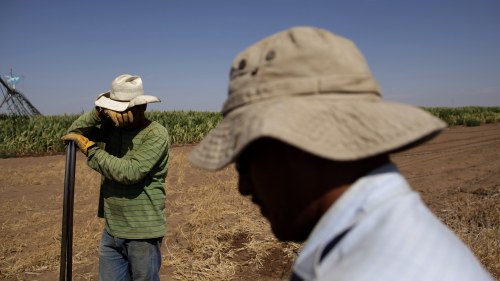A Scorching Summer Heats Up the Farmer Health Crisis

The summer’s record temperatures have reignited the international farmworker health crisis.
This summer, skyrocketing temperatures engulfed communities around the world. Dismayed, experts are resounding the alarms they have been ringing for years: human-made climate change is the overwhelming cause of rising temperatures, and these extreme conditions could become more frequent. Scorching summer temperatures, including record-breaking July, have expedited losses in farm yields and an urgent but unrecognized farmworker health crisis.
All Eyes on Yield
As high temperatures and extreme weather events create difficult conditions for crop growth, farmers teeter on the edge of extreme profit loss if a respite from the weather does not arrive soon. Climate effects are damaging farmers’ livelihoods and yields, with extreme downpours and floods blanketing regions of the world like Pakistan and China. American farmers are bracing for their lowest wheat yield in over 60 years, which is particularly concerning amid Ukrainian supply chain disruptions. Rice shortages and India’s recent ban on the export of non-basmati rice are also compounding wheat shortages and threatening the international food supply. On the other side of the agri-food supply chain, consumers are experiencing food price increases from poor weather, general market inflation, and the Ukraine war. From the start of the year through July, food prices rose almost five percent.
Heat Health Crisis
While yield shortages and price increases are visible to the everyday consumer, the heat’s effect on farm workers remains largely unacknowledged. For farmworkers, constant heat exposure leads to heat stress symptoms like dizziness, lightheadedness, and even kidney failure, which can prove fatal. The number of heat-induced illnesses and deaths is vastly underreported, and the lack of attention given to reducing heat-related illnesses could cost the world $2,400 billion by 2030. A predicted 60 percent decline in working hours by 2030 from heat stress would overwhelmingly affect the agricultural sector and threaten global food prices and nutrition security.
The US Bureau of Labor Statistics approximates almost forty workers die each year from overexposure to heat in outdoor jobs like farming. This statistic likely underestimates heat-related deaths, and the true number—for Americans alone—lands somewhere between 600 to 2,000 deaths a year, along with 170,000 injuries. Heat-related deaths are disproportionately affecting farmers, who are 35 times more likely to die from heat exposure than laborers in other industries.
Heat-related health issues overwhelmingly affect women who are pregnant and women more generally because of cultural norms that dictate women should care for other family members’ health. “Women’s time poverty”—the disproportionate time women dedicate to unpaid labor—increases as their productivity declines and work becomes more challenging to perform in high temperatures. Increasingly fatal, the heat could cause as many deaths among women in Nigeria as breast cancer by 2050.
Patchwork Legislation
In the absence of uniform legislation, current heat-related protections remain nation-specific. Some have temperature ceilings or mandated protective equipment for laborers, but many nations lack well-established and clearly enforced worker protections. Missing or loosely enforced labor laws around the world have born an international health and human rights crisis.
Unprotected by legislation, farmworkers’ pay structure rewards those who push themselves to the brink of exhaustion. Piece rates are often used over hourly rates, so farmers are paid based on the quantity of crops they harvest and are motivated to avoid breaks. Respite in the shade means money lost for farmworkers and their families.
In Gulf States like Qatar, worker protections have been an ongoing battle. The Kafala (sponsorship) system grants employers authority over job change approval for all of their employees. The Kafala system, among other legislative and cultural norms around the world, encourages forced and underpaid labor, leaving laborers—including farmworkers—with minimal rights and unlivable wages.
This month, the Biden administration proposed a new rule that could enhance protections for workers under the H-2A visa program. The expanded legislation would make it easier for labor unions to engage with seasonal agricultural workers, make wages more predictable, enhance employer accountability, and regulate farmworker abuses. Meanwhile, state governments have taken their own liberty with worker protections, ranging from mandatory shade and water breaks to actively blocking heat protections.
Even where health and wage protections exist, many marginalized and undocumented farmworkers are unlikely to speak out against employer abuses in fear of retribution. Between the threat of less pay and job loss in a legal system that does not guarantee blanket protections, farmworkers have no reason to believe their health concerns will be heard by government officials or their employers.
Short-Term Solutions
Farm labor unions are fighting to secure farmer protections for underrepresented farmworkers. Some of their demands include mandatory hydration stations and shaded breaks. Scientists and health professionals researching this health crisis are creating short-term and reasonably achievable solutions, such as reusable cooling bandannas to reduce overheating and electrolytes at hydration stations. Even after medical professionals educate farmworkers about the imminent health risks their work presents, most remain undeterred from working to support their families.
In the US and around the world, thousands of workers face life-threatening conditions to simply put food on our tables. Climate and economic solutions should not exist without human rights and health protections. How long will it take for the farmworker health crisis to be acknowledged? Perhaps when consumers notice their favorite item missing from grocery store shelves.

